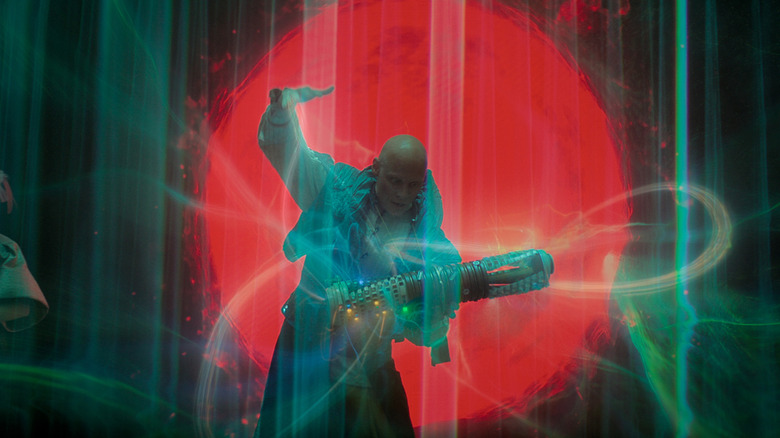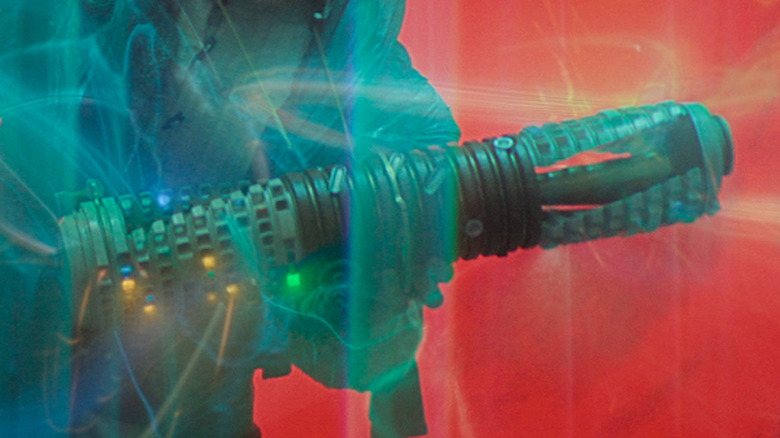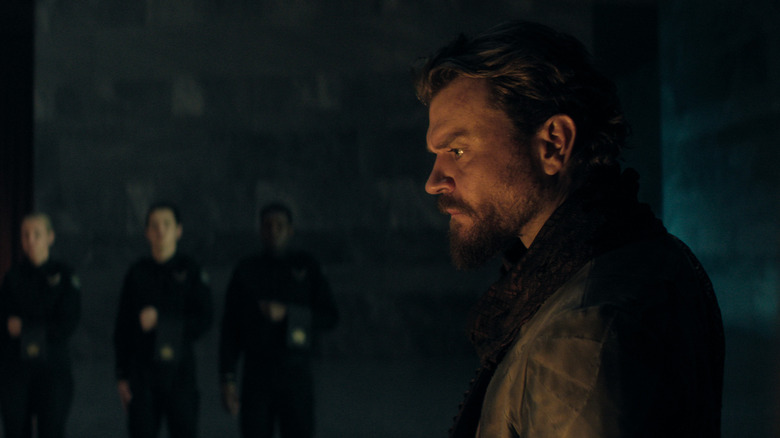Foundation Season 3: What Is A Visi-Sonor, And Why It's More Important Than You Think
This article contains spoilers for "Foundation" season 3, episode 3, "When a Book Finds You."
The third episode of "Foundation" season 3 raises the stakes, as the Mule (Pilou Asbæk) continues to march against the shrinking but still powerful Galactic Empire and the quickly growing forces of the Foundation. The show, which is set in the same universe as "I, Robot," has spent two seasons pitting the two galaxy-spanning superpowers against one another. Now, the mentalic Mule is upsetting the apple cart with a disruption that Hari Seldon and his psychohistory predictions never could have seen coming.
One of the wildest parts of episode 3 came when Han Pritcher (Brandon P. Bell) tries to pay the Mule a visit in a club. Pritcher is a secret agent for the Second Foundation (a group of powerful protagonists called mentalics who can use their minds to control others), and when he realizes that the Mule has similar power, he heads for the hills.
Before he meets the telepathic, perpetually goggled antagonist, though, Pritcher and his two companions, Bayta Mallow (Synnove Karlsen) and Toran Mallow (Cody Fern), have to work their way through a dance floor. As they head in, Pritcher says, "Warn me if you see a weapon." As he says those words, we see a man behind him on the stage holding a weird, glowing, multi-colored instrument. The musician in question is the balladeer Magnifico Giganticus (Tómas Lemarquis), personal musician to the Mule himself. As they work through the crowd, the Mallows ask Pritcher why no one is looking at them, which he casually blames on the hypnotic music. Bayta follows this up by noting that "the sound sort of gets into you." The warning about weapons and casual commentary on the influence of the instrument being played all tie together, quietly setting up one of author Isaac Asimov's wildest sci-fi inventions: the visi-sonor.
What is a visi-sonor?
The visi-sonor is a unique instrument in Isaac Asimov's world. It's also very important — it even gets its own chapter named after it in the book "Foundation and Empire." When Magnifico starts playing in that book, it explains the result much like in the show (although he isn't in a club, he's just in a quiet home in front of a few people). Magnifico's artistry unleashes a flurry of visual colors along with rhythmic, hypnotic sounds, creating intense emotional responses in his audience. Here's what it says Bayta sees while he plays:
"She noticed that closing her eyes made the color patterns all the clearer; that each little movement of color had its own little pattern of sound; that she could not identify the colors; and, lastly, that the globes were not globes but little figures."
The book goes on to say that these little flame figures dance and flicker around. There's a great relatable description when it adds. "Bayta thought of the little blobs of color that come at night when you close your eyelids till they hurt, and stare patiently."
At points, the experience is so intense that Bayta even feels actual hallucinations, as if she's in a snowstorm. The description goes on for a couple of pages. The closest part to what we see in the show goes like this:
"A glittering carpet shot out and about, whirling, spinning an insubstantial web that engulfed all space, and from it luminous shoots stabbed upward and branched into trees that sang with a music all their own."
Add it all up, and the instrument delivers an utterly unique experience — one that involves hearing, sight, and, thanks to the hidden ability of its player, even emotion.
Why is a visi-sonor important in the Foundation story?
The visi-sonor is a fun sci-fi instrument, and at first glance, it seems to be little more than a cute world-building exercise by the creators of both the book and the show. As the source material goes on to reveal, though, the visi-sonor is actually a big deal because it gives away a major reveal: Its player is a mentalic. These are the folks in Asimov's universe who unlock their minds and learn to influence people and planets through mind control. Mentalics showed up toward the end of season 2, and now season 3 has the Second Foundation (which is all mentalics) in full swing. The Mule is a rogue mentalic, too — and so is his balladeer, Magnifico Giganticus. That's how he weaves emotions into the experience when he's playing the visi-sonor.
In the books, this is a key setup, as Magnifico is actually the Mule in disguise. He pretends to be the visi-sonor-playing jester as he secretly seeks the location of the Second Foundation.
It's worth noting that the twist of the Mule actually being Magnifico all along has apparently been changed for Apple TV+'s adaptation. Instead, the show is splitting the two characters up and establishing each as their own individual with separate agency within the story.
It's yet another major creative liberty taken in a show that has had plenty of them, even as it has successfully adapted the unadaptable in Asimov's original story. One person worth keeping an eye out for throughout all of this Mule and Magnifico business, though? Preem Palver (Troy Kotsur). If the source material has anything to say on the matter, his role as First Speaker of the Second Foundation is likely going to be an important one as the Mule melodrama races toward its climactic conclusion.
"Foundation" is streaming on Apple TV+.


